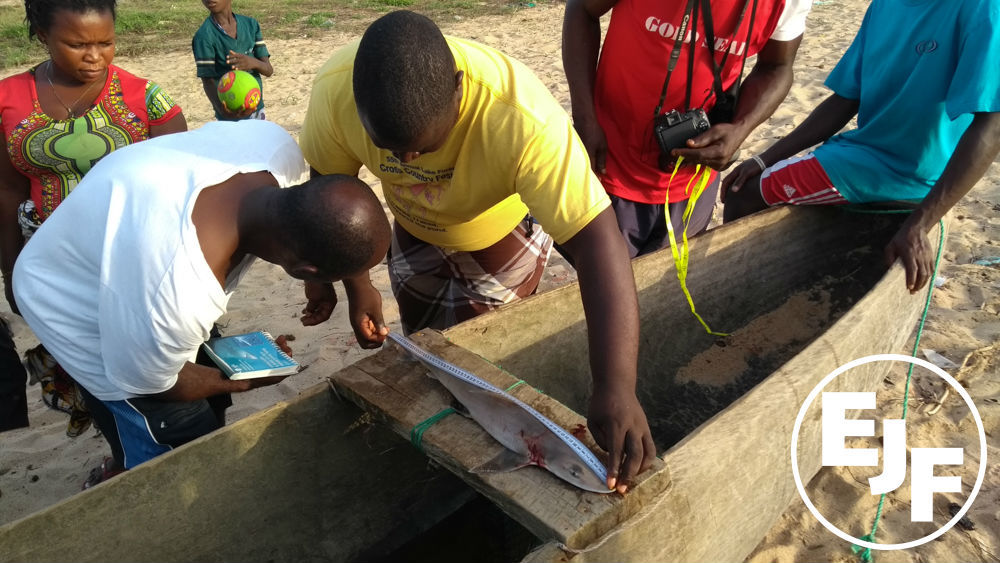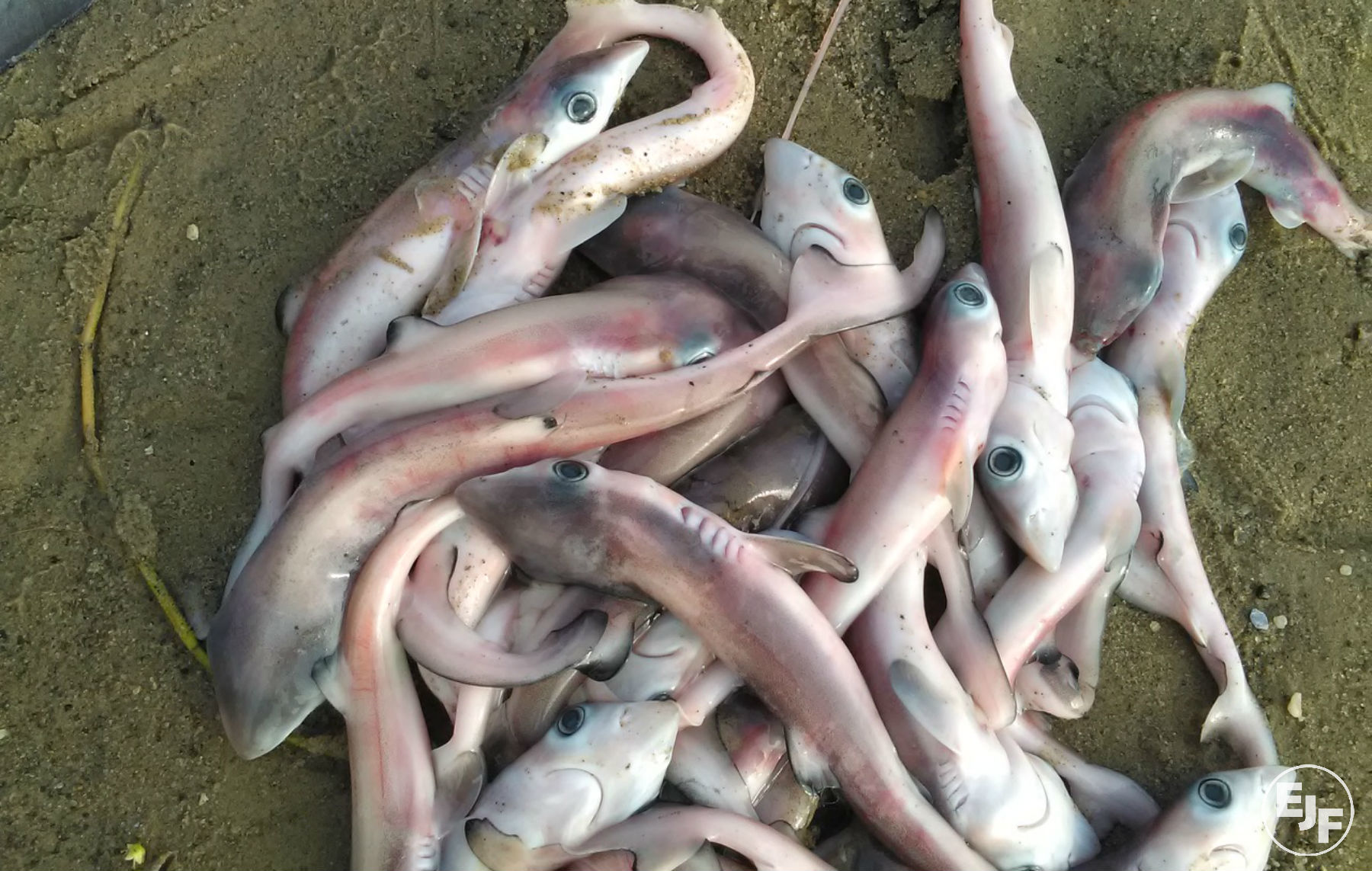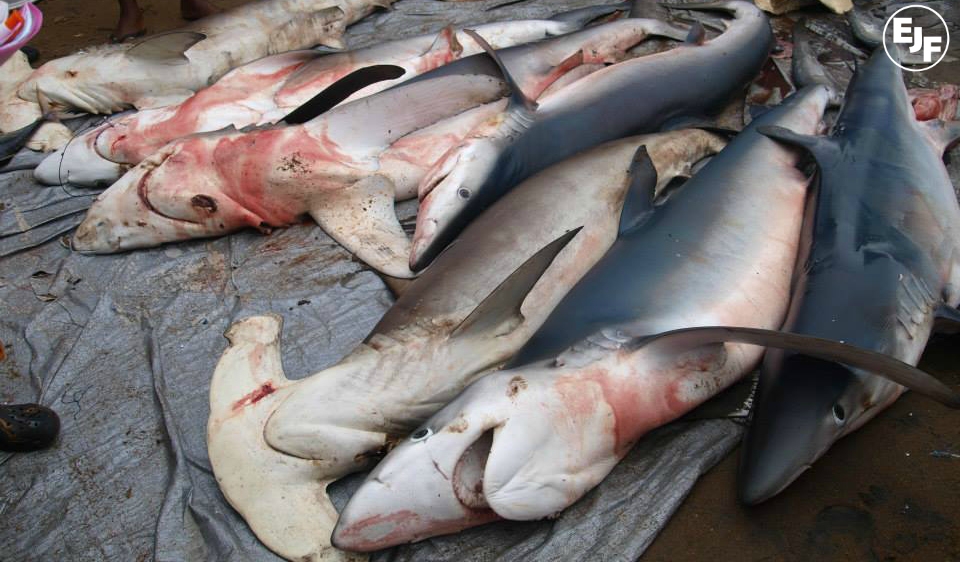
Citizen scientists from Liberian fishing communities work to protect sharks and rays
An innovative project recruiting Liberian fishing communities to provide vital data on threatened sharks and rays is building on its success and expanding across the country. A collaboration between the Environmental Justice Foundation (EJF) and the Liberian government’s National Fisheries and Aquaculture Authority (NaFAA), the project trains local people to gather key information on Liberia’s shark and ray populations and gives citizens the opportunity to feed into policies to increase fisheries sustainability.
Sharks and rays play a vital role in the health of many marine habitats, as well as being an irreplaceable part of our maritime culture. Loss of sharks, for instance, can lead to dramatic imbalances in the ecosystem that can cause the degradation of coral reefs and destruction of seagrass beds, both of which provide important nursery habitats for young fish. This is particularly important in Liberia, where 33,000 people rely on the fishing industry for their livelihoods, and 65% of all animal protein eaten comes from seafood.
Unfortunately, sharks and rays are particularly vulnerable to overfishing because they tend to grow slowly, reach sexual maturity late and have low rates of reproduction. Worldwide, a quarter of all these species are classified as threatened as a direct result of overfishing.
Previous work by EJF in Liberia between 2013-2016 found that in the catches they examined, every single shark and ray species landed was on the Red List of Threatened Species of the International Union for Conservation of Nature.
These animals currently lack any form of legal protection in Liberia, which could have real implications, not only for wildlife, but also for the coastal communities that rely on healthy marine ecosystems to provide food.
Amdeep Sanghera, EJF’s coordinator for the project, says: “We do not yet know if sharks and rays in Liberia are in trouble. There is very little information on how their populations are doing, and in some cases none at all. There is an urgent need to gather the crucial data that can support sustainable management. This is why we are excited to work with the Liberian government’s NaFAA and fishing communities in trying to secure a brighter future for sharks and rays.”
Since 2013, EJF has been working to identify and measure the sharks and rays being landed at West Point and in Robertsport in western Liberia. Building on that success, the project is being expanded to three new locations along the coast.
Emma M. Glassco, Director General of NaFAA, says: “Sharks and rays are important for the health of the marine ecosystems that support local fishing communities. With the new government in place in Liberia we have the chance to make a fresh start, taking an ecosystem approach that provides the best possible solution for both local people and marine wildlife.”
This is a long-term, participatory project, where citizens will have the opportunity to feed into management measures to ensure they reflect their needs as well as the needs of sharks and rays.
ENDS
Notes for Editors:
Watch the film for our shark campaign.
Sharks and Rays are in one of two sub-classes of cartilaginous fish, they are in the sub-class Elasmobranchii which currently contains around 1,000 extant species which can be further classified into around 400 species of sharks and 600 species of rays.
Sharks first appeared in the fossil record over 400 million years ago, nearly 300 million years before the dinosaurs. They occupy almost every marine ecosystem on earth and some can survive in freshwater, although no species lives there exclusively.
- EJF is working to build local capacity amongst a new generation of ocean defenders. We aim to harness local strengths, expertise and skills and to give recognition to the local individuals and communities who are taking a lead on protecting their natural world.
- EJF is working globally to protect endangered sharks. We are calling for a global ban on shark finning and are working in Liberia to secure a National Plan of Action to protect sharks, and for the first time give legal protection to these threatened species, with the aim of building our work across the West African region.
- EJF is calling for the protection and expansion of Inshore Exclusion Zones - reserved for artisanal fishers - and Marine Protected Areas to allow fish stocks to recover and to provide refuge for endangered or vulnerable species.
- EJF is calling for the complete ban on destructive fishing gears, including bottom-trawling, electro-fishing, and the use of explosives and poison as an important step towards limiting bycatch levels and recovering the marine environment for the benefit of marine species and the coastal communities.
- EJF is calling for all countries to require their vessels to show documentation of bycatch capture and to levy strong and appropriate penalties against those vessels discarding bycatch without documentation. If adequately enforced this would act as a deterrent against vessels dumping bycatch back in the ocean.
The Environmental Justice Foundation is a UK-based charity working internationally to protect the environment and defend human rights. EJF is a charity registered in England and Wales (1088128). www.ejfoundation.org
The National Fisheries and Aquaculture Authorityis working to promote the sustainable development of the fisheries sector in Liberia, balancing the needs of ecosystem health, food security, economic growth and social development within a framework of good governance. www.liberiafisheries.net
Contact:
Daisy Brickhill - EJF Press & Communications Officer
daisy.brickhill@ejfoundation.org
Tel: 07871946911

